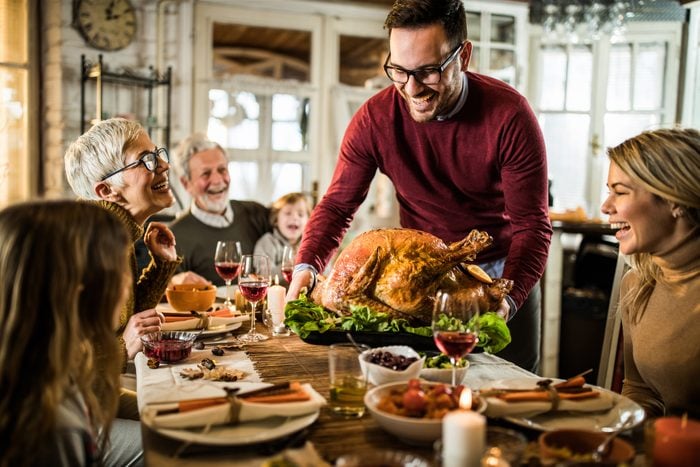
Controversial Thanksgiving topics to avoid
Get Reader’s Digest’s Read Up newsletter for more humor, cleaning, travel, tech and fun facts all week long.

Your fight with your cousin’s boyfriend
Family gossip is so tempting to share, especially when you have everyone gathered together. Resist the urge, says Marni Amsellem, PhD, a licensed psychologist practicing in Connecticut and New York. Causing drama will get you attention but in all the wrong ways. Instead of focusing on whomever you’re talking about, the rest of the family will remember your bad behavior instead.
“If there is something that you need to say to a relative about something that displeases you, save it for another time,” she says. “Otherwise this will be a dinner that the rest of the family references even decades from now—as in: ‘Remember that Thanksgiving when Sheila told cousin Lucy that she thinks her boyfriend is a cheating scumbag and she’s an idiot to stay with him?'”
And definitely don’t bring up personal arguments between you and your partner, especially if you don’t know what your fights reveal about your relationship.

What you think of the current president
Politics generally top the list of controversial Thanksgiving topics, and that may be even truer now than ever, thanks to the very contentious political climate of late. But while you should probably leave personal attacks on or declarations of love for the president off the table, that doesn’t mean you can’t discuss politics at all, Amsellem says.
“If discussing politics, the discussion needs to be held tactfully and respectfully,” she says. “Obviously not everyone holds the same views, and it is important to try to refrain from name-calling or broad-group insults. This also holds when families are in agreement about political topics as well. Tact and decorum are key in self-expression when discussing heated topics, generally speaking.”
The exception? If these are family members you only see once a year or you already know their political views are the polar opposite of yours, it’s best to just not bring it up, she says. Either way, it’s important to know how to talk to people even if you disagree.

The $500 your brother still owes you
Money is a touchy subject under the best of circumstances, and a holiday meal certainly isn’t the calmest place to have discussions about loans, how much someone’s car cost or other personal financial matters. (Besides, it’s beyond boring to have to listen to a rundown of someone else’s stock portfolio.) Money talk is so contentious that Amsellem recommends nixing it altogether.
“Does someone owe someone else a loan repayment? Does one relative feel short-changed on the inheritance after Grandma passed? If there are financial conversations that need to be had, keep it separate from the holiday or, at the very least, from the holiday meal,” she says. “You don’t want to leave a bad taste in anyone’s mouth and ruin the delicious pumpkin pie.”
Need suggestions on what else to discuss? Try one of these conversation starters that make you instantly interesting.

Your newfound atheism
Thanksgiving itself isn’t a religious holiday (unlike, say, Christmas or Passover), so religion won’t be a subtext of the get-together. That said, any big family dinner isn’t an ideal place to discuss religious topics you know your family will find upsetting or controversial. It doesn’t mean you can’t be true to your own beliefs but rather that there is a time and a place to announce your atheism/conversion to Scientology/problems with Catholicism—and the Thanksgiving table isn’t it.
“Religion can be a topic that brings out passionate opinions and great emotion, often leading to hurt feelings or explosive arguments,” says John DeGarmo, EdD, a parenting expert and director of the Foster Care Institute. “This conversation can quickly become uncomfortable and even angst-ridden.” It’s much better house guest etiquette to avoid these touchy topics during holidays.

Your petition for gun control
Gun control is a hot topic these days, but this isn’t one of those headlines that translates well to dinner conversations with a large group of relatives, says Rachel Wagner, a licensed etiquette consultant, trainer and speaker. “With continued recent instances of mass shootings in the news, it’s neither a pleasant topic nor does it strengthen family ties when discussing opposing views of gun laws,” she explains. “This topic can lead to arguments, raised tempers and drama that no one wants to have as Thanksgiving memories.”

All your children’s amazing accomplishments
It may surprise you to find this on a list of controversial Thanksgiving topics. Isn’t Thanksgiving all about being grateful for things like your children and the great things they’ve done?
Yes, but it’s one thing to mention that your daughter got a scholarship to her dream school—a fact your whole family will want to celebrate—and entirely another if all you can talk about is her winning soccer game, her straight A’s, her perfect hair and her lead role in the school musical. Just like talking up your recent raise or your Caribbean vacation, bragging of any sort has no place at family functions, Wagner says.
“You have to consider how your listeners feel; perhaps not everyone at the table has had such good fortune. Maybe they lost their job, their kid is struggling in school, they’re making do with a 10-year-old car and had a staycation instead of a vacation,” she says. “Endless bragging invites comparison, which puts a damper on not just conversations but the whole relationship. This topic can cause unnecessary sibling rivalry and division.”
To avoid Thanksgiving ending in adult sibling estrangement, leave the bragging at home.

Why your brother isn’t married yet
Thanksgiving dinner can be sheer agony for single folks because they know they’re likely to get A) drilled about their relationship status, B) pitied, C) set up with random people or D) all of the above. It’s enough to make a person want to stay home with a microwave dinner.
“Understandably, family members are genuinely interested in each other’s relationships, yet when these questions or comments are made in a large gathering or at the dining table, the person responding may feel put on the spot about something quite personal,” says Shrein Bahrami, a licensed marriage and family therapist and founder of Evolve Wellness Group. “Rarely is someone in a problem-free relationship or navigating the waters of singlehood with ease. They are then forced to either respond with a token ‘everything is great’ or be honest, resulting in a bad mood, counter to the intended lighthearted atmosphere of the event.”
Are you the recipient of intrusive questions about your relationship? Shut them down with a polite response—and keep in mind the things you shouldn’t tell your friends about your relationship.

How you feel about your saddlebags, cellulite or weight gain
Body image is a loaded topic any day of the week, but bring it up during a holiday meal, and it’s the perfect storm for low self-esteem or even eating disorders, Bahrami says. Don’t discuss your own body in a negative way, and certainly don’t criticize anyone else’s body, appearance, diet or health.
“Discussing your own or someone else’s weight or appearance is, unfortunately, an all too common topic at holiday dinners,” she says. “But the truth is no one truly enjoys these conversations.” Even a compliment can be tricky, as the person may have many feelings about changes in their appearance or weight and be quite self-conscious when attending a family function, she adds.
Instead of commenting on someone’s appearance, say something more general like, “It is so great to see you” or “I’m so glad to be reconnecting/spending time with you.” These will help them feel loved and welcome. If you struggle with finding the right words, try looking through this list of some of the best compliments for ideas.

Your sister’s children (or lack thereof)
Commenting on a relative’s family planning is a huge holiday no-no, says Justin Lavelle, chief communications officer with BeenVerified. Whether you’re commenting on the number of kids they have, asking when they’ll have another or speculating on when they’ll start their family, you put them in an incredibly awkward situation. Though it may be well-intentioned, essentially asking “When will you be sleeping together?” is definitely one of the more controversial Thanksgiving topics.
“No one likes to be put on the spot about their reproductive choices,” he says. “So let the couple be and eat their turkey in peace.” If they want you to know this information, they’ll bring it up. In the meantime, stick to these funny Thanksgiving quotes to share around the table.
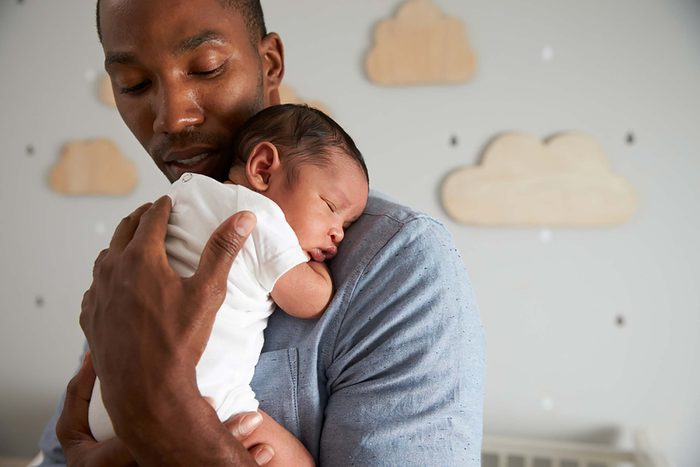
Parenting advice
Let’s face it: No one is the absolute expert when it comes to parenting. Giving someone advice on how to raise their children or criticizing their children’s behavior—even when meant in a kind way—is rarely helpful and may start an argument, says Evie Granville and Sarah Davis, parenting etiquette experts and podcasters.
“When it comes to parenting, everyone’s got an opinion—even people who don’t have kids! Whether it’s breastfeeding vs. bottle-feeding, sleep-training or staying home vs. working outside the home, there’s always something to get miffed about,” they say. “Don’t use time together over the holidays to question other people’s parenting choices. Just assume everyone’s weighed the pros and cons of a given parenting decision and come to the conclusion that the best option for their nuclear family is the thing they’re already doing.”
Instead of critiquing, try sharing hilarious parenting stories instead. Who knows, maybe it will become a new holiday tradition!
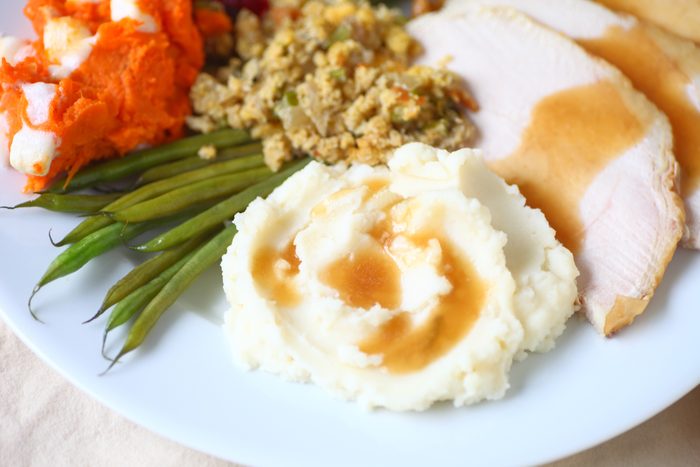
How much your aunt is eating
Don’t make it your business to call out the amount of food on anyone else’s plate. Whether their plate is heaped with food or the person is taking tiny portions, commenting on their eating habits is rude, says national etiquette expert Diane Gottsman, author of Modern Etiquette for a Better Life and founder of the Protocol School of Texas. But for your own sake, learn which foods nutritionists avoid on Thanksgiving.
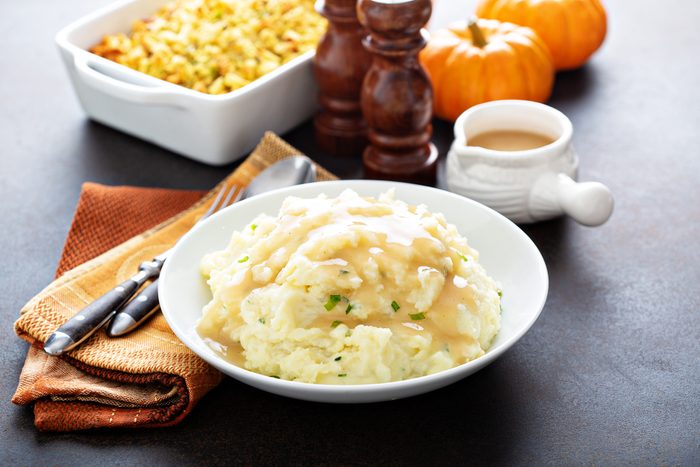
All the foods your niece can’t eat
Never make guests feel bad about veganism, food allergies or any other dietary restrictions—and don’t insist that just a bite won’t hurt. “People tend to dismiss allergies and overlook the fact that they can be life-threatening in some situations,” says Gottsman. If you’re hosting, ask about dietary restrictions before you start cooking (without making guests feel guilty) so that everyone will be able to enjoy the meal.

Your uncle’s embarrassing moment
You can’t help but giggle every time you remember an instance in which a relative made a fool out of himself, but not everyone will be laughing when you bring it up. “What one family member may see as funny may be someone else’s uncomfortable moment,” says Gottsman. “No one should bear the brunt of another person’s joke or story.”
Sure, some people might be able to take a joke, but pay attention to body language, she recommends. If the reaction is an awkward smile or a scowl, apologize and change the subject. Here’s how else to handle life’s most embarrassing moments.
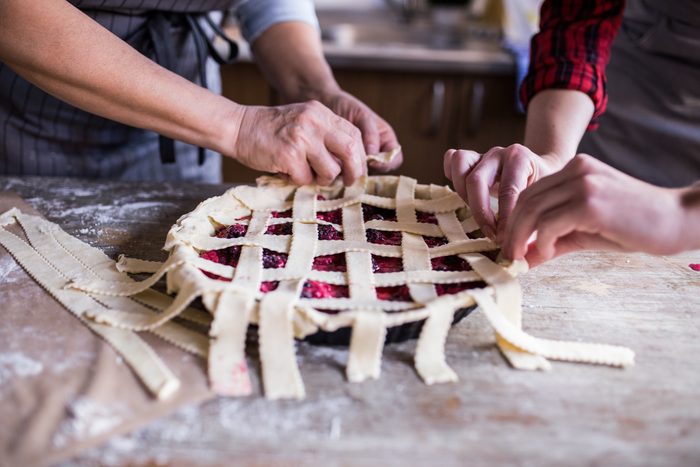
How you’d change the recipe
As well-intentioned as it may be, keep your cooking advice to yourself. Sure, a pinch of spice or a different cooking method might improve the dish in your humble opinion, but voicing that is an insult to the host’s culinary skills. Even something like “How much butter did you use in this dish?” or “I bet this is fattening!” comes across as rude, says Gottsman. Just smile, thank the chef for making the food and give it a compliment—that grateful spirit is what Thanksgiving is all about.

Your nephew’s semester at college
If you’re seeing relatives for the first time since they left for college, you might want to ask how classes are going—but the students might not appreciate it. “It can come across as prying or nosey, especially if the college kid is struggling with grades or is stressing about what they are going to do when they graduate,” says Gottsman. Let your relatives share their college stories on their own time.
Sources:
- Marni Amsellem, PhD, licensed psychologist practicing in Connecticut and New York
- John DeGarmo, EdD, parenting expert and director of the Foster Care Institute
- Shrein Bahrami, licensed marriage and family therapist and founder of Evolve Wellness Group
- Rachel Wagner, licensed etiquette consultant, trainer and speaker
- Justin Lavelle, chief communications officer for BeenVerified
- Diane Gottsman, author of Modern Etiquette for a Better Life and founder of The Protocol School of Texas
- Evie Granville and Sarah Davis, parenting etiquette experts and podcasters
